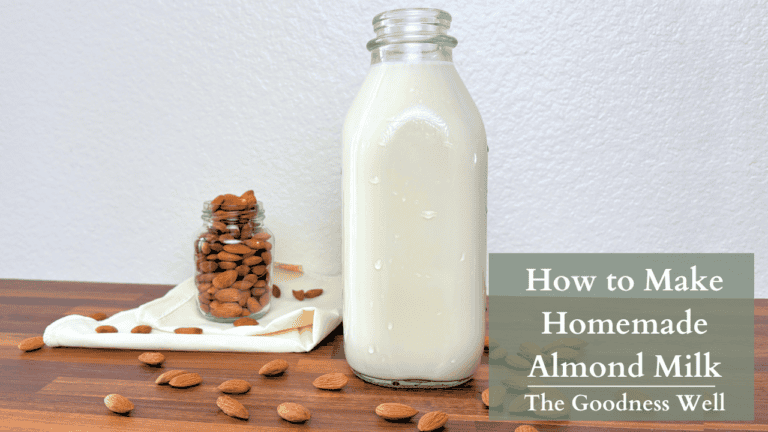Boost Your Health with These 15 Medicinal Herbs
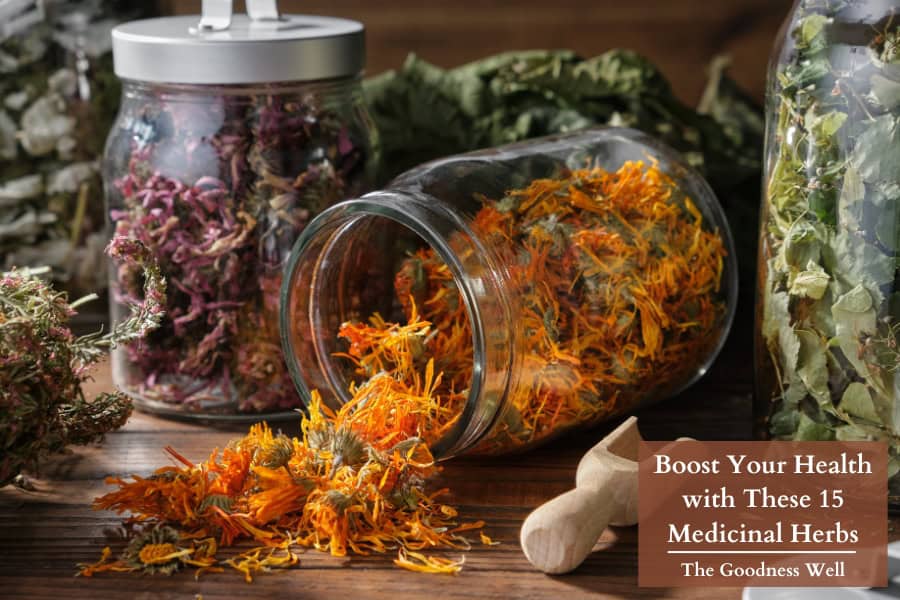
For thousands of years, long before the creation of modern medicine, herbs were used to treat different illnesses and support overall health.
Even still today herbs are used to bring many different health benefits.
Whether you’re looking for digestive support, stress relief, or immune system benefits, using these medicinal herbs can be a natural and effective way to improve your health.
Here are 15 medicinal herbs that offer amazing health benefits and the best part all of these can be grown right in your own backyard or even in a pot inside your home!

Herbal Power!
Herbs are power! Nowadays doctors are so easy to prescribe pill after pill… and don’t get me wrong, modern medicine has its own benefits. But as modern medicine has become a much more common practice we’ve forgotten the importance of holistic healing through medicinal herbs.
Here are just a few ways holistic healing through medical herbs can be beneficial:
- Fewer Side Effects: Herbal remedies are often gentler on the body with fewer side effects than synthetic drugs.
- Whole Plant Benefits: Herbs provide a range of beneficial compounds that work synergistically, unlike isolated ingredients in modern medicine.
- Holistic Approach: Herbal medicine treats the person as a whole, focusing on overall well-being rather than just symptoms.
- Cost-Effective: Herbal treatments are typically more affordable and can often be grown at home.
- Fewer Chemicals: Herbal remedies are free from synthetic chemicals and preservatives found in many pharmaceuticals.
- Sustainability: Herbal medicine has a lower environmental impact compared to pharmaceutical production.
- Chronic Condition Management: Herbal treatments offer safer, long-term alternatives for managing chronic conditions.
Now let’s get into the top 15 herbs and their benefits.
15 Herbs with Medicinal Benefits🌿
1. Basil
Basil contains antioxidants like beta-carotene and vitamin A, which help protect your cells from damage and support your immune system. It also has anti-inflammatory properties due to compounds like eugenol, which can help reduce swelling and pain.
Basil can help reduce stress by lowering cortisol levels and may help balance blood sugar, which is great for managing or preventing diabetes.
- Good for: Stress relief, digestion, blood sugar control, and inflammation.
- How to Use:
- For Inflammation: Make a basil-infused oil to rub on sore muscles or joints.
- For Stress: Brew a calming basil tea by steeping a handful of fresh leaves in hot water for 10 minutes.
- For Digestion: Add basil to salads or chew a few fresh leaves after a heavy meal to promote digestion.
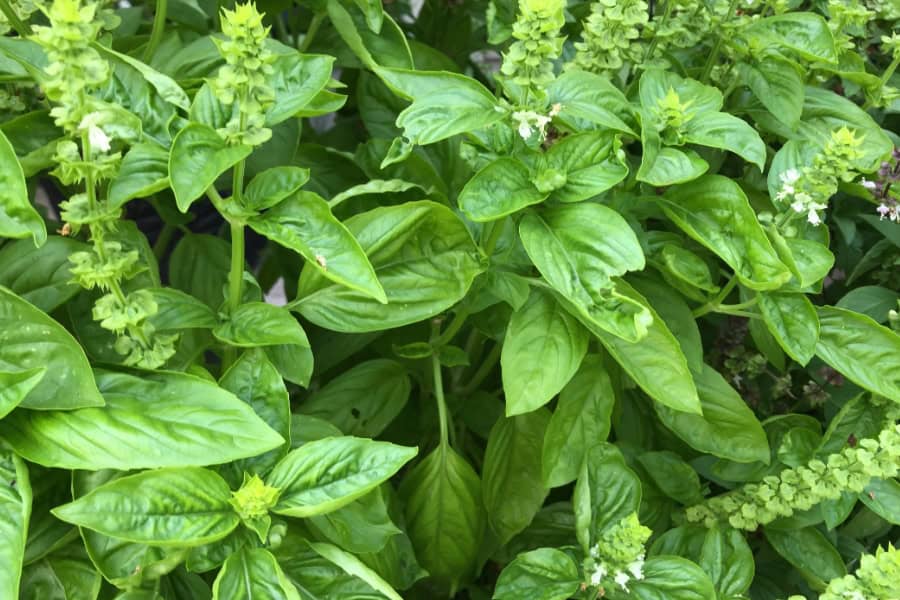
2. Mint (Peppermint & Spearmint)
Mint is more than just a refreshing herb for flavoring food and tea. It’s rich in menthol, which relaxes the muscles of the digestive tract, making it a great remedy for indigestion, bloating, and gas.
Its cooling effect can help relieve headaches, especially tension headaches.
Peppermint oil, in particular, is known for improving focus and mental clarity. I like to rub peppermint oil on my temples to help soothe my tension headaches.
- Good for: Digestive issues, headaches, focus, and oral health.
- How to Use:
- For Digestion: Brew peppermint tea to ease bloating or add fresh mint to water for a refreshing digestive aid.
- For Headaches: Apply diluted peppermint oil to your temples and neck for relief from tension headaches.
- For Focus: Sniff fresh mint leaves or keep a peppermint plant at your desk to boost concentration.
- For Oral Health: Chew fresh mint leaves or use mint oil in a homemade mouthwash to freshen your breath and fight bacteria.
3. Thyme
This small but mighty herb is packed with powerful medicinal properties, particularly for respiratory health. Thyme is packed with thymol, a compound that helps fight infections.
It’s a strong antimicrobial herb, making it great for treating coughs, colds, and sore throats. It also contains antioxidants that support the immune system. Thyme can aid digestion by relaxing the muscles in the stomach and intestines.
- Good for: Coughs, colds, sore throats, digestion, and boosting the immune system.
- How to Use:
- For Colds & Coughs: Brew thyme tea by steeping fresh or dried thyme in hot water for 10 minutes. Add honey for added antibacterial benefits.
- For Sore Throats: Gargle with cooled thyme tea to soothe throat inflammation and kill bacteria.
- For Digestion: Add thyme to soups or stews to aid digestion, especially if you’re eating heavier meals.
4. Rosemary
Rosemary contains compounds like carnosic acid, which protects the brain from oxidative stress and can improve cognitive function. It also boosts circulation, which may help with cold hands and feet.
Rosemary has anti-inflammatory properties and can relieve joint pain and its antimicrobial properties can be used to clean wounds.
- Good for: Memory, focus, circulation, joint pain, and wound care.
- How to Use:
- For Memory & Focus: Inhale rosemary oil or brew rosemary tea before studying or working to boost mental clarity.
- For Circulation: Add rosemary to your bath or make a rosemary foot soak to improve circulation in cold hands and feet.
- For Joint Pain: Use rosemary-infused oil to massage sore joints or muscles for pain relief.
- For Wounds: Brew rosemary tea and let it cool, then use it as a natural antiseptic wash for minor cuts or scrapes.
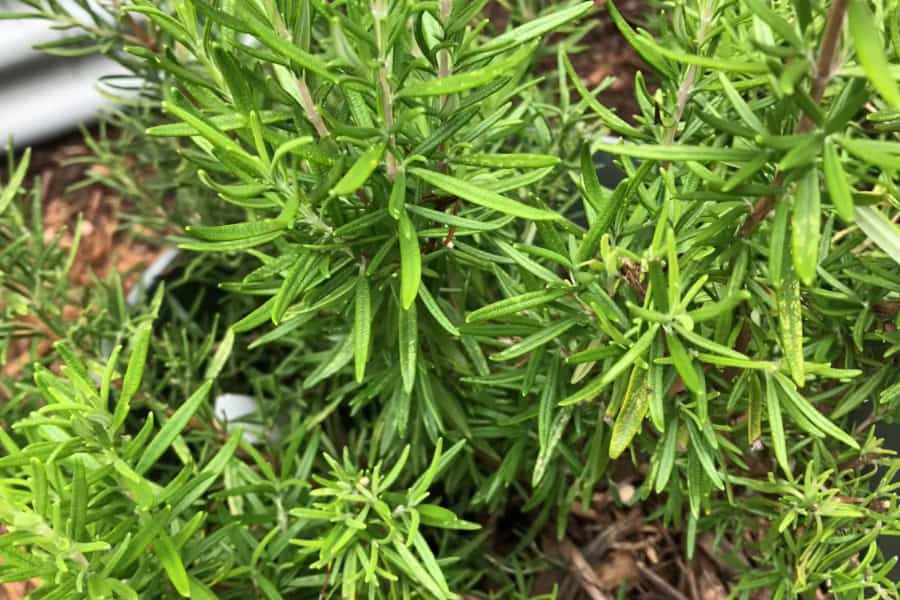
5. Oregano
Oregano is rich in carvacrol and thymol, which are strong antimicrobial compounds. These compounds help fight bacteria, viruses, and fungi, making oregano an effective natural remedy for colds, flu, and other infections.
Oregano also has antioxidant properties, helping protect the body from oxidative stress and supporting immunity. It can also help reduce inflammation and improve gut health.
- Good for: Fighting infections, immune support, gut health, and reducing inflammation.
- How to Use:
- For Infections: Make oregano tea by steeping fresh or dried leaves in hot water to help fight off cold or flu symptoms.
- For Gut Health: Add oregano to meals like soups, sauces, and stews to help with digestion and combat gut infections.
- For Skin Infections: Dilute oregano oil with a carrier oil and apply it to fungal infections like athlete’s foot or ringworm.
6. Lavender
Pretty much every lotion, tea, candle, or any other product claiming to be soothing has lavender in it… or a wannabe version of it. That’s because real lavender has stress relief properties, especially for helping you relax and sleep better.
Lavender reduces anxiety by calming the nervous system, making it easier to unwind. It’s also a natural sleep aid, helping improve the quality of your sleep.
- Good for: Anxiety, insomnia, headaches, and mild pain relief.
- How to Use:
- For Sleep: Use lavender essential oil in a diffuser at night or place dried lavender under your pillow.
- For Anxiety: Brew a lavender tea (1 teaspoon dried flowers per cup of water) and sip when feeling stressed.
- For Pain Relief: Add lavender essential oil to bath salts and soak to relieve sore muscles and tension.
7. Sage
Sage contains compounds that help improve memory, concentration, and brain function. It’s also great for oral health, reducing inflammation and bacteria in the mouth. Sage’s antimicrobial properties make it helpful for soothing sore throats.
- Good for: Memory support, cognitive function, oral health, and throat inflammation.
- How to Use:
- For Brain Health: Brew sage tea (1 teaspoon dried sage per cup of water) to help improve focus and memory.
- For Sore Throats: Gargle with cooled sage tea to reduce inflammation and discomfort.
- For Oral Health: Use sage in mouthwash or chew fresh leaves to freshen your breath and reduce bacteria.

8. Parsley
Parsley is more than a garnish or soeming people put on top of their food to make it look better than it actually is lol. It’s actually packed with nutrients that support kidney function and immunity and it’s rich in vitamins A, C, and K, which are vital for immune function and bone health.
It acts as a diuretic, helping to flush out excess fluids and it’s a great source of antioxidants that fight free radicals in the body.
- Good for: Kidney health, immune support, and reducing fluid retention.
- How to Use:
- For Immune Support: Add fresh parsley to smoothies, salads, or soups to get a daily vitamin boost.
- For Kidney Health: Drink parsley tea (boil a handful of fresh parsley in water) to help with fluid retention and detoxification.
- For Bone Health: Incorporate fresh parsley into dishes like pesto or sprinkle over roasted vegetables for an extra nutrient punch.
9. Cilantro
Cilantro is well-known for its detoxifying abilities, for example, it helps bind heavy metals like lead and mercury, aiding in detoxification.
It also supports digestion and has vitamins that boost immune function, such as vitamin C and beta-carotene.
- Good for: Detoxifying heavy metals, digestion, and immune support.
- How to Use:
- For Detoxification: Add fresh cilantro to green smoothies or salads to support your body’s natural detox processes.
- For Digestion: Use cilantro in salsas, and curries, or sprinkle over tacos to help with digestion and reduce bloating.
- For Immune Support: Include cilantro in homemade dips like guacamole or chutney to natural vitamins to your meal.
10. Lemon Balm
Lemon balm is a calming herb that not only reduces stress but also supports digestion and mood.
It has a mild sedative effect, helping to reduce anxiety and promote relaxation and it can also ease digestive discomfort, especially in cases of indigestion or bloating.
Lemon balm can improve mood, making it beneficial for those with mild depression or stress-related symptoms.
- Good for: Anxiety, digestion, and improving mood.
- How to Use:
- For Anxiety: Brew lemon balm tea by steeping fresh leaves in hot water to create a calming drink before bed.
- For Digestive Discomfort: Add fresh lemon balm to salads or desserts to soothe the stomach.
- For Mood Support: Sip on lemon balm tea throughout the day to promote relaxation and uplift your mood.
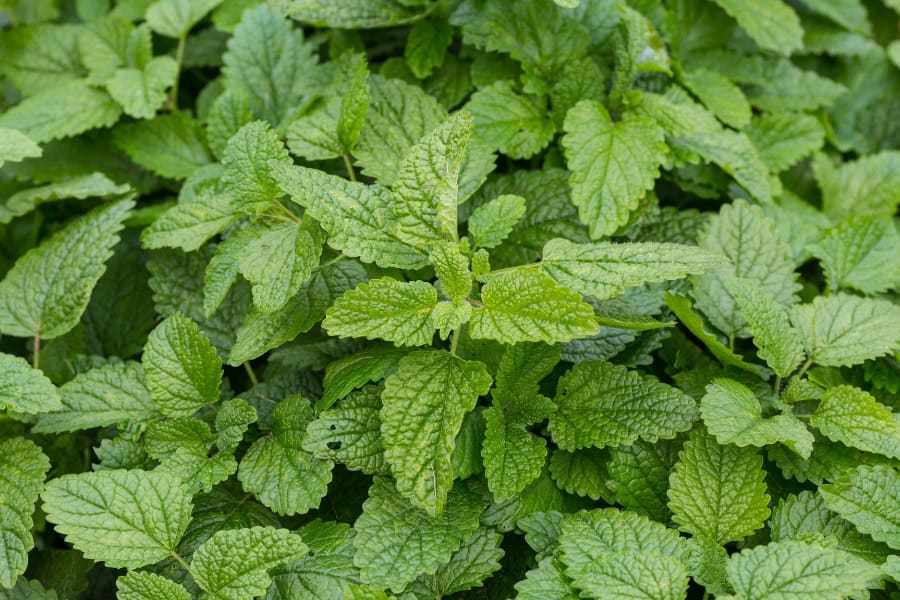
11. Chamomile
Chamomile has strong anti-inflammatory and calming properties. It helps reduce anxiety and promotes relaxation, making it ideal for people who struggle with stress or insomnia.
Chamomile also soothes digestive issues like indigestion and gas. It’s found commonly as a tea.
- Good for: Stress, insomnia, and digestive issues.
- How to Use:
- For Stress Relief: Drink chamomile tea before bed to relax your mind and body.
- For Digestive Issues: Brew chamomile tea after meals to calm the stomach and ease bloating.
- For Sleep: Add dried chamomile flowers to a warm bath or use them in a tea for a calming bedtime routine.
12. Echinacea
Echinacea is a powerful herb for supporting your immune system, especially during cold and flu season!
It stimulates the immune system and has been shown to help prevent and reduce the duration of colds. Echinacea has anti-inflammatory properties that help with symptoms like sore throats and congestion and can help fight off infections.
- Good for: Boosting the immune system, fighting colds, and reducing inflammation.
- How to Use:
- For Immune Support: Brew echinacea tea or take it in tincture form to ward off colds and strengthen the immune system.
- For Cold Relief: Start drinking echinacea tea at the first sign of a cold to help reduce symptoms and shorten the duration.
13. Turmeric
Turmeric is well-known for its powerful anti-inflammatory and antioxidant effects, thanks to its active compound, curcumin.
It reduces inflammation, making it great for people with joint pain, arthritis, or inflammatory conditions. Turmeric also supports brain health by reducing oxidative stress and may improve memory and mood.
- Good for: Joint health, brain function, digestion, and inflammation.
- How to Use:
- For Inflammation: Add turmeric to curries, soups, or smoothies to reduce inflammation in the body.
- For Joint Pain: Make a golden milk latte by mixing turmeric with warm milk and honey.
- For Brain Health: Use turmeric in cooking or take curcumin supplements to support brain function and reduce oxidative damage.
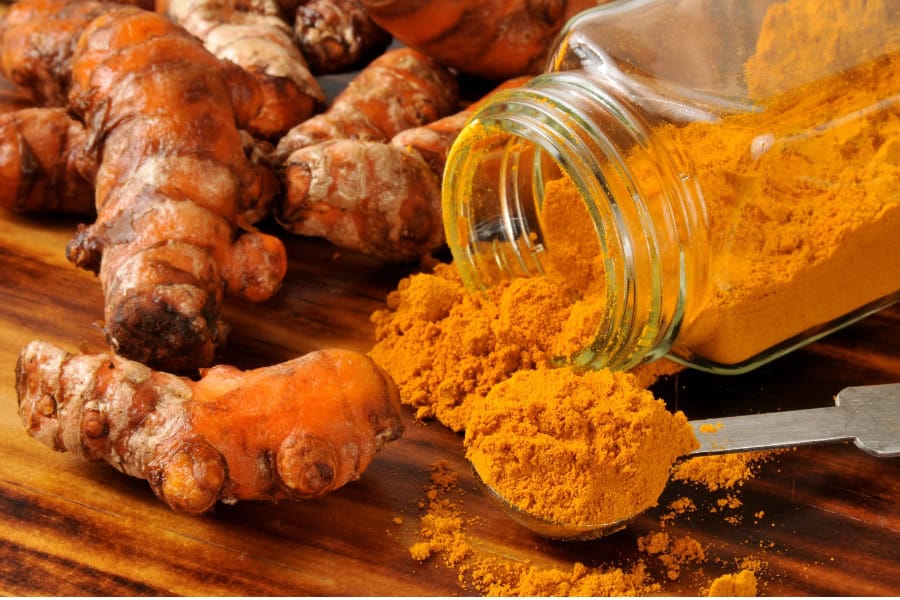
14. Aloe Vera
Aloe vera is famous for its ability to soothe and heal skin irritations, but it also offers internal health benefits.
It can help heal burns, sunburns, and skin irritations. Internally, it supports digestive health by soothing the stomach and intestines, and it can relieve constipation.
- Good for: Skin healing, digestive health, and constipation relief.
- How to Use:
- For Skin: Apply fresh aloe vera gel directly to burns, cuts, or sunburns for faster healing.
- For Digestion: Drink aloe vera juice to soothe the digestive tract and relieve constipation (make sure it’s food-grade).
15. St. John’s Wort
I know… not the most appealing name but St. John’s Wort has been traditionally used to help with mild to moderate depression, mood regulation, and anxiety relief.
St. John’s Wort contains hypericin, which helps balance neurotransmitters in the brain, making it effective for relieving symptoms of depression and improving mood.
- Good for: Mild depression, anxiety, and mood regulation.
- How to Use:
- For Depression: Take St. John’s Wort as a tea or tincture to help balance mood, but be sure to consult a healthcare professional, as it may interact with medications.
- For Anxiety: Drink St. John’s Wort tea to calm your mind and relieve anxious feelings.

Adding these medicinal herbs into your daily life can be a simple and natural way to boost your health, whether you’re looking to ease stress, improve digestion, or strengthen your immune system.
Just remember everything in moderation! …And while these herbs can offer great benefits, they shouldn’t be used to replace regular doctor checkups or professional medical advice.
Let us know what herbs you like to use! As always thank you for reading!






